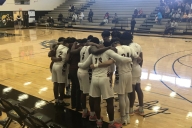You have /5 articles left.
Sign up for a free account or log in.
The National Collegiate Athletic Association has again reduced some of the historic sanctions it imposed against Pennsylvania State University following former assistant coach Jerry Sandusky's conviction on 45 counts of child abuse in 2012.
The NCAA's executive committee met Monday and voted to end Penn State's postseason ban immediately, allowing the football team to be eligible for bowl games this season, two years earlier than the punishment originally had called for. The university will also be allowed to offer 85 football scholarships -- the maximum allowed under NCAA rules -- a season earlier than expected, in 2015.
Some of those scholarships were already restored last year.
Other sanctions, including a $60 million fine and the vacating of 112 wins under former head coach Joe Paterno, will remain and are unlikely to be reversed. Shortly after the NCAA's announcement, the Big Ten Conference said Penn State can once again compete in its postseason football tournament this season as well.
In a statement Monday, the university said the reversal was "welcome news."
"We are very appreciative of the opportunities the NCAA and Big Ten have provided with today's announcement," James Franklin, Penn State's head football coach, said. "This team plays for each other. We play for Penn State, our families, the former players, our students, alumni, fans and the community."
The NCAA's decision followed the release of a new report by George Mitchell, a former U.S. senator who is tasked with overseeing Penn State's compliance with a 2012 "consent decree" and authoring quarterly reports about the university's progress. In the report, released earlier Monday, Mitchell said Penn State's new administration had made "substantial progress" toward "fostering an ethical culture" on campus and in its sports programs.
He recommended lifting the sanctions that most directly affected Penn State athletes, as the students "bear no personal responsibility for the underlying reasons" behind the punishment.
"Many of these student-athletes chose to remain at Penn State in spite of the sanctions and the opportunity to transfer to another school without penalty," Mitchell wrote in the 58-page report. "Many Penn State football players demonstrated loyalty by remaining at their university for two years without the prospect of playing in a postseason bowl game. In light of Penn State’s responsiveness to its obligations and the many improvements it has instituted, I believe these student-athletes should have the opportunity to play in the postseason should they earn it on the field this year."
In a statement, the executive committee said it endorses Mitchell's recommendations, and that it may even end the former senator's monitoring of the university "substantially earlier." The oversight was originally meant to last until 2017.
“Penn State’s commitment to the integrity of its athletics department and its progress toward meeting the requirements of the Consent Decree are clear,” said Rita Hartung Cheng, president of Northern Arizona University and the chair of Monday’s meeting.
Student reaction at Penn State was mostly a mix of jubilation and resentment: excitement for being bowl eligible and anger about the sanctions that remain.
Thousands of students gathered on Penn State's campus Monday night for an impromptu rally, according to the Daily Collegian, Penn State's student newspaper. The celebration was punctuated with moments of brief protest, including one that has some questioning the supposed change in campus culture regarding the scandal. Before running toward the university's Beaver Stadium, where a bronze sculpture of Paterno once stood, students repeatedly chanted, "Where's the statue?"
Paterno, a long-revered figure at Penn State and in college sports more generally, was one of several university officials who were fired after a grand jury charged in 2011 that they had covered up Sandusky's abuse. Paterno died soon after from complications from lung cancer. The bronze statue was removed six months later, one day before the NCAA announced its sanctions against the university.
Critics on Monday were largely supportive of the reduction of those sanctions. Though the NCAA certainly doesn't view it as such, Shelley Steinbach, former general counsel for the American Council on Education, said the move was a "mea culpa."
"The NCAA grossly abused its power," Steinbach said. "They're rolling back the sanctions year by year. They were pretty much scraping the bottom of the legal barrel to make the legal argument they made."
Josephine Potuto, a law professor and NCAA faculty athletics representative at the University of Nebraska, agreed, saying that the sanctions were "ill-advised" to begin with, as the association does not have any bylaws addressing child molestation. It was a matter, she said, best left for criminal, civil and regulatory systems to address, not the NCAA.
"I think the NCAA has an important function to serve but I don't think they should be the hall monitor for everything that happens on campus involving athletics," Potuto said. "The fact that this happened in athletics was not a sufficient enough trigger for the NCAA to come in and impose sanctions."
And that's what sets this punishment apart from similarly harsh -- and criticized -- sanctions imposed against the University of Southern California in 2010. Those sanctions followed the less-serious revelation that two former players had accepted gifts from agents while still on the university's football and basketball teams in the mid-2000s.
USC's football team was banned from postseason participation for two years. The team is still down 30 scholarships, despite making its own progress by hiring "a new president, athletic director, and coach after the scandal," wrote Max Meyer, a sports writer at Neon Tommy, a USC news website. Several other USC fans took to Twitter this week, outraged at what they viewed as an unfair discrepancy in treatment of the two institutions.
But there's a key difference, said Potuto, who was involved in the NCAA's handling of USC's infraction case.
"Nobody's going to argue that child molestation is less serious than an agent paying a current student athlete," she said. "But the issue is whether child molesting should be in the scope of what the NCAA regulates. Whether you think the sanctions against USC are right or wrong, they were made in a regularized process, with the ability to appeal, and within the scope of NCAA bylaws. The punishment against Penn State was a one-off deal that was slightly but rightly corrected."








